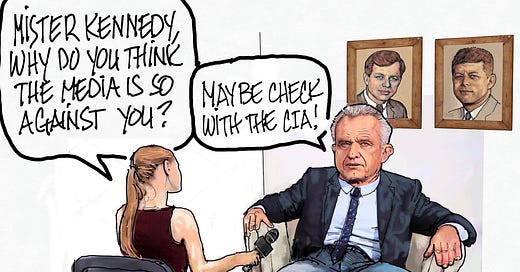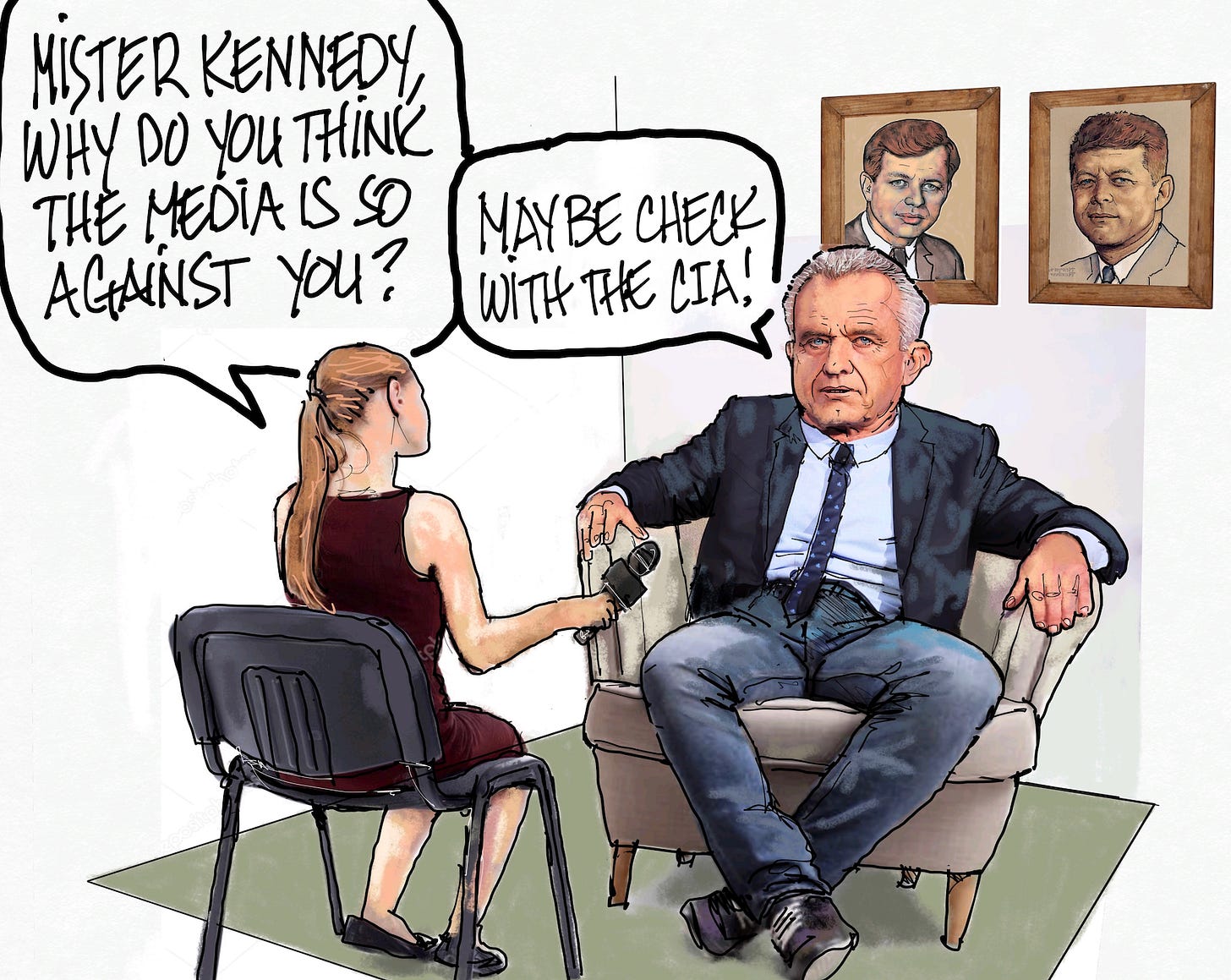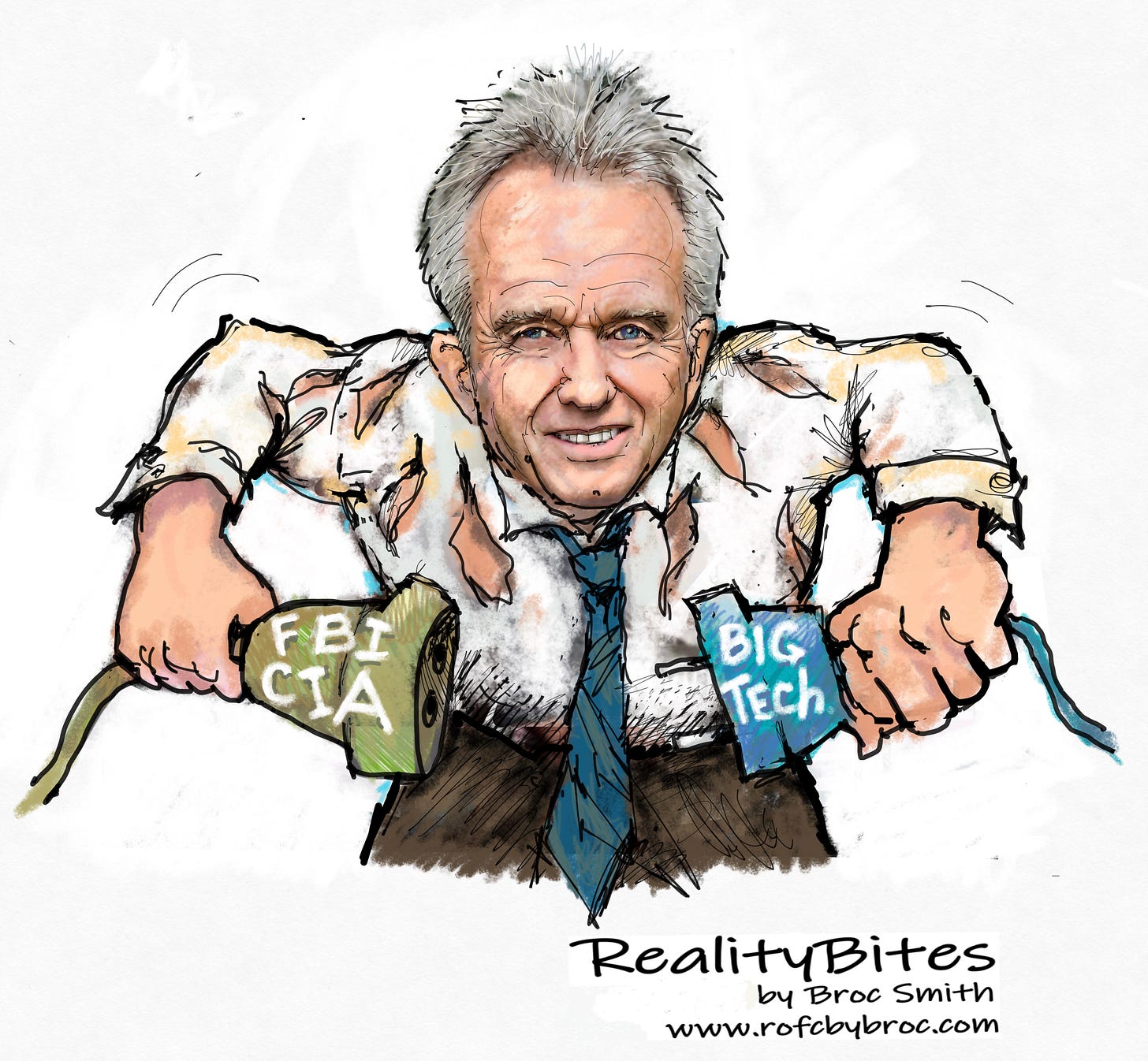By Jeremy Kuzmarov, Special to The Kennedy Beacon
Forty-eight years ago, Democratic Senator Frank Church and his investigators exposed the CIA’s dark history to an American public that was shocked and horrified by its spying, blackmail, torture, political murder and coups against foreign democracies.
The result was a series of restrictive laws and policies designed to reign in the CIA and curb its criminal behavior. But those well-meaning measures didn’t curb the CIA at all; they just made it more fastidious about leaving fingerprints.
However, the CIA did learn a valuable lesson from its pummeling by the Church Committee: Never let another honest and courageous man like Frank Church reach Congress, let alone the White House.
And, save for a few honorable exceptions, they never did. Which is why the thought that Robert F. Kennedy Jr. might actually become president has the agency shivering in its boots.
What scares them most is that Kennedy, like the late Senator Church, is motivated by the same passionate devotion to truthfulness and open government that the Democratic Party once proudly shared, but now disdains.
Kennedy has further followed in Frank Church’s footsteps by calling out the CIA—for its involvement in the assassination of his uncle, John F. Kennedy, and father, Robert F. Kennedy, and for its development of biowarfare techniques during the Cold War that lay the groundwork for the manufacture of the COVID-19 virus through illegal gain-of-function research.
Senator Frank Church (D-ID) holding up a document during 1975 hearings that he presided over which exposed CIA crimes. [Source: jfkfacts.org]
Kennedy’s integrity and courage in taking on the CIA explains the ferocious campaign of smears, lies, vilification and censorship that the CIA has launched against him in an attempt to cripple his candidacy, abetted by the Pentagon, the military-industrial complex, Big Pharma, Wall Street, the banks, mainstream media, and the chorus of faux liberals and ersatz Democrats who now bizarrely praise the CIA as fulsomely as they once condemned it.
Given the prominence of these faux-liberals among Democratic Party leadership, it’s no surprise that when Kennedy announced his run for the presidency he instantly became the target of widespread smear attacks by the Democratic Party establishment and their corporate media apparatchiks.
Characteristic was House Speaker Hakim Jeffries (D-NY), who accused Kennedy of promoting “racism and conspiracy theories,” after he talked about government censorship in front of the House Subcommittee on the Weaponization of the Federal Government in July.
Jeffries told The Hill: “why would you give Robert F. Kennedy Jr. a congressional platform to spew his hatred? Here’s the answer: Robert F. Kennedy Jr. is a living, breathing false-flag operation. His whole campaign is being run by right-wing political operatives who have one objective: try to take down President Joe Biden.”
Kennedy in reality has never spewed any hatred or conspiracy theories and his campaign is not being run by right-wing political operatives.
Jeffries and his contemporaries are oblivious to the fact that Kennedy adopts policy positions that align with Democratic Party politicians of the 1960s and 1970s, which Jeffries—a staunch supporter of the war in Ukraine, the CIA and COVID-19 lockdowns—and most others in the party have strayed far away from.
Besides his uncle and father, Kennedy’s exposure of the CIA marks him as a direct heir to Church, whose career is profiled in a new biography by James and Thomas Risen that is aptly titled: The Last Honest Man. The book’s subtitle is, The CIA, the FBI, the Mafia and One Senator’s Fight to Save Democracy.
The book is an important reminder of what liberal-democrats once stood for—and might yet stand for again if Kennedy’s campaign gains even greater political traction.
Like Kennedy, Church was an environmentalist who supported labor rights and liberal social programs. He grew up admiring Idaho’s long-time Republican Senator William Borah, the chairman of the Senate Foreign Relations Committee from 1924-1933, who opposed U.S. involvement in World Wars I and II; promoted a Good Neighbor Policy with Mexico and South America; and sought diplomatic recognition of the Soviet Union following the Bolshevik Revolution.
Church’s critical views on the CIA developed during World War II when he worked in military intelligence under General Robert McClure, the “forgotten father of U.S. Army special warfare.”
McClure deceived the American public into believing that Chiang Kai-Shek was the savior of China, when in reality he was a corrupt warlord who stole millions in U.S. foreign aid and lost China’s Civil War to the Chinese Communist Party (CCP).
After World War II, Church supported the 1948 presidential campaign of Henry Wallace, who wanted to remove all U.S. military bases around the world and engage in peaceful diplomacy with the Soviet Union—a prelude to JFK.
Wallace’s imprint carried over into Church’s leadership of his famous committee in 1975, exposing the FBI and CIA, which came at a time when many Americans were disillusioned by U.S. military intervention in Vietnam.
Church said he viewed the committee as a kind of constitutional convention, debating the proper balance between national security and civil liberties.
The scale had clearly tipped against the latter under the Operation MK-ULTRA, through which the CIA carried out illegal drug testing on unwitting victims in an attempt to develop a magic truth serum that could be used in Cold War interrogations.
The FBI further violated constitutional liberties under a counterintelligence program (COINTELPRO), where it spied on, and tried to destroy left-wing political groups.
One of the key findings of the Church Committee was that the CIA had engaged in political assassinations, likely with the sanction of the White House.
Gaining access to an archive of secret CIA cables between CIA headquarters and the CIA station in Congo, the Church Committee investigated the assassination of Congo’s first postcolonial Prime Minister, Patrice Lumumba, who had infuriated the Western powers by attempting to nationalize Congo’s rich mineral resources.
The committee found that Richard M. Bissell, Jr., the CIA’s chief of clandestine operations, subsequently asked CIA scientist Sidney Gottlieb to develop a poison to kill Lumumba—with the orders coming directly from President Dwight D. Eisenhower.
The Church Committee is probably best known for helping to publicly expose CIA-Mafia plots to kill Cuban revolutionary leader Fidel Castro.
The CIA’s key liaison with the Mafia was found to be Robert Maheu, a private investigator who had also been assigned by the CIA to blackmail Indonesia’s socialist President Sukarno because the Eisenhower administration thought he was, like Lumumba, too independent and insufficiently pro-American.
For the Castro plot, Maheu worked with mobster Johnny Roselli, whose dismembered body was found in a 55-gallon drum floating off a bay in Miami shortly after he testified before the Church Committee. Though relishing the media attention after his testimony, Roselli told Church Committee staffer Patrick Shea that he was not “going to be around much longer.”
Besides the CIA, the Church Committee carried out pioneering investigations into constitutional violations by the National Security Agency (NSA). These were run under a highly secretive program, code-named SHAMROCK, through which the NSA collected information from international telegrams going in and out of New York between Americans and overseas recipients.
The CIA also illegally asked the NSA to spy on the communications of civil rights and anti-war protesters who had been placed on a CIA watchlist under a secret program known as MINARET.
Church said on NBC’s Meet the Press that, “in the need to develop a capacity to know what potential enemies are doing, the United States government has perfected a technological capability that enables us to monitor the messages that go through the air…. At any time, that capability could be turned around on the American people and no American would have any privacy left.”
These words ring prophetic today in an era of internet surveillance and censorship, which Kennedy has tirelessly spoken out against. For this, he has been viciously smeared in a campaign that has adopted tactics right out of the CIA’s playbook.
Church was the target of a similar campaign by the CIA, which tried to depict his committee as orchestrated by the KGB [Soviet intelligence services] and falsely blamed Church for the assassination of Richard Welch, the CIA Station chief in Athens.
When Jimmy Carter contemplated selecting Church as his running mate in 1976, he was intimidated by CIA veterans led by James J. Angleton, who helped prevent Church’s reelection to the U.S. Senate in 1980.
Steve Symms, Church’s Republican opponent, said that Angleton would come to his office and smoke cigarettes on his couch while he recounted the damage he claimed that Church had wreaked on the CIA. When Symms won, he was invited to a party at which he said he was the only person there not former intelligence. “It was quite impressive to meet all these people,” Symms later said, “and see how deeply they all despised Church.”
Kennedy is despised today by the CIA for the same reasons as is Church.
His exposure of the corruption of the CIA and other intelligence agencies stands in stark contrast to President Joe Biden, who as a member of the Senate intelligence oversight committee in the 1980s betrayed Frank Church’s legacy by helping to ensure that the committee served to rubber-stamp and cover up illegal CIA operations—rather than act as a watchdog as it was intended.
Later, as Chairman of the Senate Foreign Relations committee, President Biden championed color revolutions in Eastern Europe financed in part by the National Endowment for Democracy (NED), a CIA cutout. As president, he has turned the CIA loose in Ukraine and refused to release documents on the Kennedy assassination that almost surely implicate the Agency.
In his 1966 song “Love Me, I’m a Liberal,” Phil Ochs mocked the pretensions of liberal Democrats of his era who supported the purge of communists from the AFL-CIO; saw Malcolm X as a dangerous radical; backed U.S. military intervention in Korea; and were all for civil rights until Blacks and Puerto Ricans moved next door.
If he were still alive, Ochs would have new verses to sing about Biden and his supporters who are the ultimate sellouts and phonies.
Kennedy by contrast is a throwback to Church and other progressive Democrats who were genuine in their commitment to liberal reform and to development of a peaceful foreign policy that adheres to the norms of international law.
Stephen Brown contributed to this article.
Jeremy Kuzmarov is Managing editor of CovertAction Magazine. He is author of five books on U.S. foreign policy, including The Russians are Coming, Again: The First Cold War as Tragedy, the Second as Farce, with John Marciano (New York: Monthly Review Press, 2018); Obama’s Unending Wars: Fronting the Foreign Policy of the Permanent Warfare State (Clarity Press, 2019) and the forthcoming book, War Monger: How Clinton’s Malign Foreign Policy Launched the U.S. Trajectory From Bush II to Biden (Clarity Press, 2023).







If RFK Jr. gets into the White House, the first thing he signs should be an Executive Order abolishing the CIA that murdered his father and uncle.
Frank Church died of cancer not long after--maybe the same kind of fast-acting cancer that killed Jack Ruby, and was developed as described in the book, "Dr. Mary's Monkey." Bobby, be careful who feeds you.